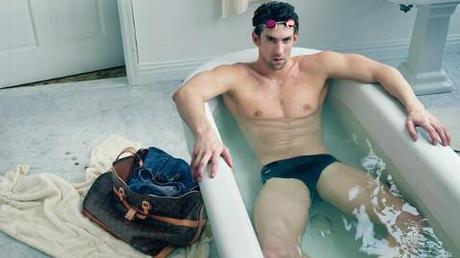
Image from abcnews.go.com
Michael Phelps could be in hot water – not the cold bathtub he appears to be in – for his recent photo shoot with the French luxury house Louis Vuitton.
Photos of Phelps taken by famed photographer Annie Leibovitz were leaked on the internet late last week, violating the International Olympics Committee’s controversial Rule 40, which states athletes can’t promote any non-Olympic sponsors from July 18 to August 15.
Punishments for the rule range from fines to a stripping of medals.
The campaign was set to begin on August 16 in order to comply with the IOC’s campaign against ambush marketing. Someone jumped the gun and the photos appeared on a wide variety of websites starting on the second Tuesday of the Olympics.
Louis Vuitton denies releasing the photographs, as does Phelps’ camp.
Rule 40 states “a competitor or a team may lose the benefit of any ranking obtained in relation to other events at the Olympic Games at which he or it was disqualified or excluded; in such case the medals and diplomas won by him or it shall be returned to the IOC.” In other words, Phelps could theoretically be stripped of his medals from London.
The odds of that happening are about the same as the swimmer winning six gold medals in women’s gymnastics at the Rio 2016 Games. Unless there’s a vast conspiracy involving the maker of high-end trunks and the world’s greatest swimmer, it seems safe to assume that these photos were leaked by a rogue individual. Pictures that aren’t meant for public consumption get leaked all the time. Michael Phelps can attest to that fact.
Phelps’ longtime agent, Peter Carlisle, dismissed any suggestion Friday that the retired swimmer may have violated IOC rules when the pictures were leaked. He told The Associated Press there’s no issue with the IOC because Phelps did not authorize use of the pictures.
“He didn’t violate Rule 40, it’s as simple as that,” Carlisle said. “All that matters is whether the athlete permitted that use. That’s all he can control. In this case, Michael did not authorize that use. The images hadn’t even been reviewed, much less approved. It’s as simple as that.”

